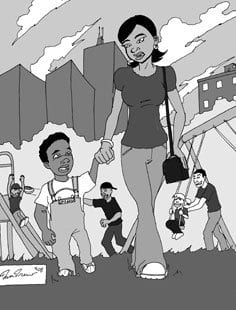
An impediment to maturity
|
|
“Mommy, what’s a daddy?” |
Father’s Day is an appropriate time to discuss the problem of paternal negligence. Sen. Barack Obama did just that in a speech at the Apostolic Church of God, a predominantly black church in Chicago.
Obama complained that too many black fathers are “… missing from too many lives and too many homes.” He continued, “They have abandoned their responsibilities, acting like boys instead of men. And the foundations of our families are weaker because of it.”
Lest this problem be attributed to racial discrimination, Obama asserted, “We can’t simply write these problems off to past injustices. Those injustices are real. There’s a reason our families are in disrepair, and some of it has to do with a tragic history, but we can’t keep using it as an excuse.”
Nonetheless, Obama made it clear that he had little respect for an absentee father. “Any fool can have a child,” he claimed. “It’s the courage to raise a child that makes you a father.”
With this speech on Sunday, June 15, Obama accomplished two objectives. First, he established that he had severed his family’s relations with his prior church, Trinity United Church of Christ, whose former pastor, the Rev. Jeremiah Wright, had created a crisis in Obama’s presidential campaign. Second, he established that his administration would not excuse bad conduct by blacks because of assertions of racial oppression.
According to reports, parishioners of the Apostolic Church of God enthusiastically received Obama’s words. There seems to be a growing impatience in black communities for the aberrant behavior of neighbors that destroys local tranquility. However, there was a great outcry of opposition to “The Negro Family: The Case for National Action,” a 1965 report authored by the late U.S. Sen. Daniel Patrick Moynihan. The report stated that in 1960, 33.7 percent of black children under 18 lived in single parent homes, compared with only 10 percent of white children.
Since then the situation has become worse. According to the U.S. Census, in 2006 65 percent of black children under 18 lived in single parent families, compared with 23 percent of white children. Of those black children, 91 percent lived with their mothers. It is generally agreed that the widespread absence of fathers from the home adversely affects the children. Obama was courageous to raise an issue so fraught with emotion.
Invest in the future
Students across the country who have successfully completed their academic work will march to the strains of “Pomp and Circumstance” to receive their high school diplomas this month. That is a festive and important event but it does not complete their education. Some postgraduate work will be required to develop the skills necessary for employment in today’s technological workplace.
While a free high school education is available to all, schooling after that requires students to pay tuition. For students from low-income families, the cost of college education is a problem. The availability of student loans is crucial. As the Banner pointed out in its June 12 editorial (“Fostering the best”), some banks have withdrawn from making loans to students at community colleges.
U.S. Sens. Patty Murray, D-Wash., and Christopher Dodd, D-Conn., have filed legislation to prevent such restrictions from banks in the program of federally guaranteed loans. Black leaders should be actively involved in efforts to assure that low-income students can find funds for their education. This issue is far more important for black progress than some civil rights matters that clog the agenda. It’s a matter of priorities.






